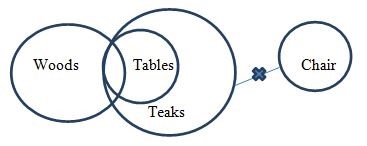Question
Statements: Some woods are tables. All
tables are teaks. No teak is a chair. Conclusions: I. Some woods are teaks. II. Some woods are not chairs. III. Some tables are not chairs. In each question below are given three statements followed by three conclusions numbered I, II and III. You have to take the two given statements to be true even if they seem to be at variance with commonly known facts and then decide which of the given conclusions logically follows from the two given statements, disregarding commonly known facts.Solution
Some woods are tables (I) + All tables are teaks (A) ⇒ Some woods are teaks (I) + No teak is a chair(E) ⇒ Some woods are not chairs(O) . Hence, conclusion I and II follows. All tables are teaks(A) + No teak is a chair(E) ⇒ No table is a chair(E) ⇒ Conversion ⇒ Some tables are not chairs(O). Hence, conclusion III follows. Alternate Method: Minimum possibility: 
What is the theme of World Hindi Day in 2024?
Kanpur city was established in which of the following year?
The 12th Joint Working Group (JWG) on Border Management meeting is held on 15th and 16th June, 2022 between India and which other country?
What was the revised economic growth forecast for India in FY2024-25 as per the latest RBI’s MPC report?
Why does distilled water not conduct electricity?
Whose tomb is in Chunargarh, he is -
Lusaka is the capital of which of these countries?
Where was India's first Gati Shakti Research Chair established?
In the recent Brazilian F1 Grand Prix championship who became the winner of the year 2022?
Which queen died fighting Mughal armies while defending Garha Katanga in 1564?



